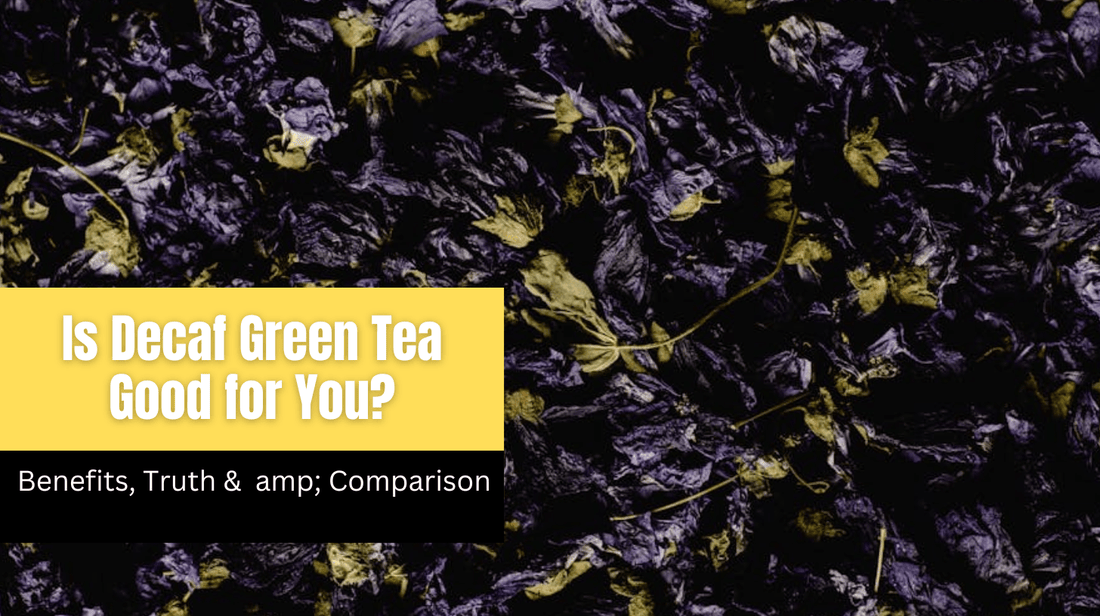
Is Decaf Green Tea Good for You? Benefits, Truth and Comparison
Yes, decaf green tea is good for you. While it contains lower amounts of caffeine and catechins than regular green tea, it still provides antioxidants, aids digestion, and supports general wellness. It’s a perfect option for those sensitive to caffeine or looking for a soothing, evening beverage.
Let’s break down what makes decaffeinated green tea beneficial, how it's made, and how it compares to its caffeinated counterpart.
What Is Decaffeinated Green Tea?
Decaffeinated green tea is green tea that has undergone a process to remove most of its natural caffeine. This is usually done using one of three methods:
- Carbon dioxide (CO2) method – preserves flavor and nutrients best
- Water processing – gentle but may remove more antioxidants
- Solvent-based – less common in premium teas, can affect quality
While decaf green tea isn’t completely caffeine-free, it usually contains 2–5 mg of caffeine per cup, compared to 25–35 mg in regular green tea (source).
Benefits of Decaffeinated Green Tea
Despite lower caffeine content, decaf green tea still retains many health benefits, especially if decaffeinated using a natural method:
1. Antioxidant Protection
Decaf green tea still contains EGCG, a powerful catechin known for its anti-inflammatory and anti-cancer properties (source).
2. Digestive Support
It supports healthy digestion and reduces bloating, making it a gentle option post-meals.
3. Heart Health
Green tea polyphenols can help reduce LDL cholesterol and blood pressure—even in decaf form.
4. Better Sleep Hygiene
Without the stimulating effects of caffeine, decaf green tea is ideal for evening routines.
Is Decaffeinated Green Tea Still Healthy?
Yes, decaffeinated green tea is still healthy, especially if processed using non-chemical methods. It’s rich in polyphenols, L-theanine, and small amounts of EGCG.
While caffeine does enhance the absorption of catechins, studies have found that the benefits of decaf green tea still include:
- Improved metabolic function
- Reduced inflammation
- Better hydration and digestion
For the best health effects, opt for naturally decaffeinated green teas and rotate with caffeinated varieties if needed.
Green Tea vs Decaffeinated Green Tea
| Feature | Caffeinated Green Tea | Decaffeinated Green Tea |
|---|---|---|
| Caffeine Content | 25–35 mg | 2–5 mg |
| EGCG & Antioxidants | Higher | Moderate (some lost in process) |
| Best For | Energy, metabolism | Sleep, sensitivity to caffeine |
| When to Drink | Morning, midday | Evening, night |
What About Naturally Caffeine-Free Alternatives?
If you want something caffeine-free but with herbal benefits, consider:
- 85° Spearmint Lemongrass Herbal Tea (Caffeine-Free)
- 93° Himalayan Moringa Tea (Superfood Herbal)
- 05° Tulsi Tea (Sacred Basil Tea)
These teas support digestion, immunity, and relaxation without needing to be decaffeinated.
Related Read:
Want to know how caffeine in green tea affects your body and how to manage your intake? Check out: Does Green Tea Have Caffeine? Truth You Need to Know
FAQs
1. Is decaf green tea still good for you?
Yes, especially when it’s decaffeinated using natural methods. It offers antioxidants and gentle digestive support.
2. Does decaffeinated green tea have the same benefits?
Mostly, yes. It has fewer catechins but still provides polyphenols and health perks.
3. Does decaf green tea have caffeine?
Yes, but only about 2–5 mg per cup.
4. Is decaffeinated green tea still healthy compared to regular green tea?
It is a healthy choice for people sensitive to caffeine or looking to relax in the evening.
5. Is green tea naturally decaffeinated?
No, green tea contains caffeine naturally. Decaf versions are processed to remove it.
6. Does decaf green tea have side effects?
Rarely. However, low-quality decaf tea processed with chemicals may lose nutrients or affect taste.










